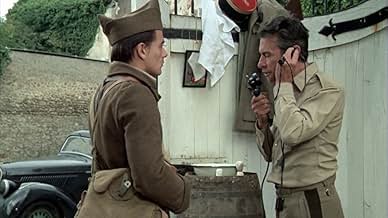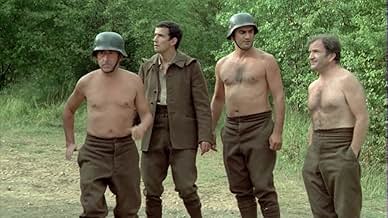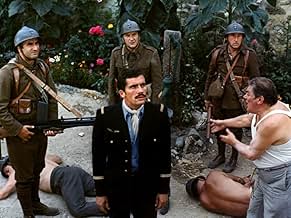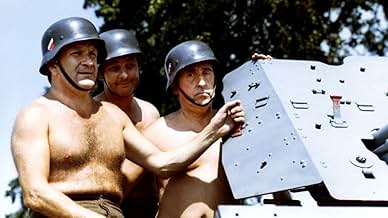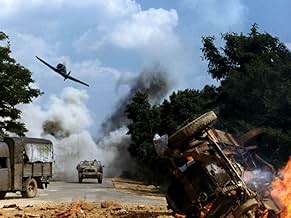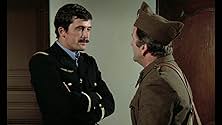Mais où est donc passée la 7ème compagnie
- 1973
- 1h 35m
IMDb RATING
6.9/10
2.6K
YOUR RATING
Three French army scouts escape capture and go behind enemy lines during WWII, urged by a lieutenant to fight rather than hide.Three French army scouts escape capture and go behind enemy lines during WWII, urged by a lieutenant to fight rather than hide.Three French army scouts escape capture and go behind enemy lines during WWII, urged by a lieutenant to fight rather than hide.
Magali Vendeuil
- La mère de la fillette
- (as Magali de Vendeuil)
Marcelle Ranson-Hervé
- Mme Thévenay
- (as Marcelle Ranson Hervé)
Erik Colin
- Lieutenant Duvauchel
- (as Eric Colin)
Konrad von Bork
- le commandant Von Kurtel
- (as Conrad Von Bork)
- Director
- Writer
- All cast & crew
- Production, box office & more at IMDbPro
Storyline
Did you know
- TriviaAldo Maccione often had arguments with director Robert Lamoureux, because the Italian actor amused the crew a bit too often and then interfered with the shooting. Maccione told Lamoureux that Jean Lefebvre arrived late on the set also too often. But it was said that Lefebvre was a good friend of the director.
- GoofsWhen Chaudard and Tassin look for Pitivier (who went swimming), the shadow of the boom mic is visible on the bottom right corner.
- ConnectionsFollowed by On a retrouvé la 7ème compagnie ! (1975)
Featured review
This movie is brilliant and I loved it very much. It is brilliant because it has a funny slapstick comedy adventure plot, but also because it makes fun of the overall situation of the events, i.e. the Fall of France.
The theme of the movie is explicitly laid out in the opening; the German invasion of France was a terrible disaster for France, yet the French Army regards it as an orderly retreat. I found this incredibly clever. I could wax lyrical for hours on how subversively funny that is. Especially for a French movie. Especially for the seventies. Especially for a mainstream comedy.
For me that is basically the movie, in the first sequence everything is said out loud and exemplified with the HQ scene. The rest of the movie, through the adventure of the three soldiers is merely a careful exposé of all the different and various consequences and resulting scenarios. Of course always in a lighthearted tone and played for laughs. It is a tableau of WW2 in France, seen through a comedic lens.
In terms of plot, it means the movie centers on the actual military retreat. From the beginning, the war is lost, but our heroes do not know that and care even less. What is almost refreshing in terms of military drama is that these soldiers are mainly interested in very trivial concerns: when and what to eat, and where and when to rest. It is not about the ideology, the geo-politics, the nations, the country or the Army. It is not really about surviving either in the fashion of other great war movies like Das Boot. Is just about not being bothered. About taking a swim in the river and chasing rabbits. The movie juxtaposes these petty concerns with the huge conflict. It has that typically French, "theatre de Guignol" quality, where whatever happens it stays wholesome and devolves into slapstick and where the "weak" wins over the "strong" in a backward sort of way.
I loved all the various little vignettes the film shows. First, they meet with a rural family, the older peasant and his wife, which allows for a comment on WW1. Then the introduction of the Lieutenant is an opportunity to show the separation between the officers and the soldiers, how soldiers are common folk and the officers and airmen come from more privileged backgrounds. I regret that the movie did not go a bit further with this, and it doesn't really venture into social commentary, but it is still there. Then they meet a household where the men are absent, illustrating two types of womanhood confronted with the war; the mother and the wife. There is the perfidious shopkeeper, that is happier to do business with the invader than his compatriots. There is an extended sequence that is almost heart-wrenching when they stumbled upon a road of refugees trying to flee the combat area. These scenarios are incredibly genuine but they are also always devices for jokes or good lines.
And that is the brilliance of this film, it's not just good jokes about the war. It is good humour but with the purpose of going through the impact of these historical events on regular people in different situations. It a good comedy film, but it is also a good war film.
The theme of the movie is explicitly laid out in the opening; the German invasion of France was a terrible disaster for France, yet the French Army regards it as an orderly retreat. I found this incredibly clever. I could wax lyrical for hours on how subversively funny that is. Especially for a French movie. Especially for the seventies. Especially for a mainstream comedy.
For me that is basically the movie, in the first sequence everything is said out loud and exemplified with the HQ scene. The rest of the movie, through the adventure of the three soldiers is merely a careful exposé of all the different and various consequences and resulting scenarios. Of course always in a lighthearted tone and played for laughs. It is a tableau of WW2 in France, seen through a comedic lens.
In terms of plot, it means the movie centers on the actual military retreat. From the beginning, the war is lost, but our heroes do not know that and care even less. What is almost refreshing in terms of military drama is that these soldiers are mainly interested in very trivial concerns: when and what to eat, and where and when to rest. It is not about the ideology, the geo-politics, the nations, the country or the Army. It is not really about surviving either in the fashion of other great war movies like Das Boot. Is just about not being bothered. About taking a swim in the river and chasing rabbits. The movie juxtaposes these petty concerns with the huge conflict. It has that typically French, "theatre de Guignol" quality, where whatever happens it stays wholesome and devolves into slapstick and where the "weak" wins over the "strong" in a backward sort of way.
I loved all the various little vignettes the film shows. First, they meet with a rural family, the older peasant and his wife, which allows for a comment on WW1. Then the introduction of the Lieutenant is an opportunity to show the separation between the officers and the soldiers, how soldiers are common folk and the officers and airmen come from more privileged backgrounds. I regret that the movie did not go a bit further with this, and it doesn't really venture into social commentary, but it is still there. Then they meet a household where the men are absent, illustrating two types of womanhood confronted with the war; the mother and the wife. There is the perfidious shopkeeper, that is happier to do business with the invader than his compatriots. There is an extended sequence that is almost heart-wrenching when they stumbled upon a road of refugees trying to flee the combat area. These scenarios are incredibly genuine but they are also always devices for jokes or good lines.
And that is the brilliance of this film, it's not just good jokes about the war. It is good humour but with the purpose of going through the impact of these historical events on regular people in different situations. It a good comedy film, but it is also a good war film.
- Criticalstaff
- Feb 22, 2021
- Permalink
- How long is Now Where Did the Seventh Company Get to??Powered by Alexa
Details
- Release date
- Countries of origin
- Languages
- Also known as
- Now Where Did the Seventh Company Get to?
- Production companies
- See more company credits at IMDbPro
- Runtime1 hour 35 minutes
- Sound mix
- Aspect ratio
- 1.66 : 1
Contribute to this page
Suggest an edit or add missing content

Top Gap
By what name was Mais où est donc passée la 7ème compagnie (1973) officially released in Canada in English?
Answer
![Watch Bande-Annonce [VO]](https://m.media-amazon.com/images/M/MV5BZWY2MDkzMjItYzY3Ny00ZDBjLTllMDEtOWRlMWE5OTI1ZjJiXkEyXkFqcGdeQXRodW1ibmFpbC1pbml0aWFsaXplcg@@._V1_QL75_UX500_CR0)
